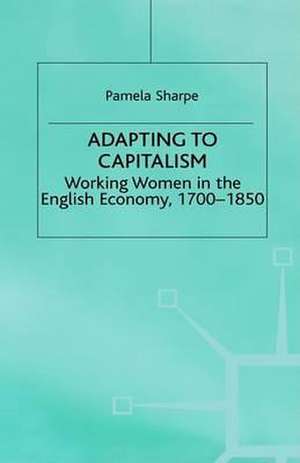Adapting to Capitalism: Working Women in the English Economy, 1700–1850: Studies in Gender History
Autor Pamela Sharpeen Limba Engleză Hardback – 19 feb 1996
| Toate formatele și edițiile | Preț | Express |
|---|---|---|
| Paperback (1) | 940.72 lei 6-8 săpt. | |
| Palgrave Macmillan UK – 1996 | 940.72 lei 6-8 săpt. | |
| Hardback (1) | 945.79 lei 6-8 săpt. | |
| Palgrave Macmillan UK – 19 feb 1996 | 945.79 lei 6-8 săpt. |
Preț: 945.79 lei
Preț vechi: 1153.39 lei
-18% Nou
Puncte Express: 1419
Preț estimativ în valută:
180.97€ • 189.46$ • 149.75£
180.97€ • 189.46$ • 149.75£
Carte tipărită la comandă
Livrare economică 07-21 aprilie
Preluare comenzi: 021 569.72.76
Specificații
ISBN-13: 9780333633915
ISBN-10: 0333633911
Pagini: 240
Ilustrații: XI, 226 p.
Dimensiuni: 140 x 216 x 18 mm
Greutate: 0.45 kg
Ediția:1996
Editura: Palgrave Macmillan UK
Colecția Palgrave Macmillan
Seria Studies in Gender History
Locul publicării:London, United Kingdom
ISBN-10: 0333633911
Pagini: 240
Ilustrații: XI, 226 p.
Dimensiuni: 140 x 216 x 18 mm
Greutate: 0.45 kg
Ediția:1996
Editura: Palgrave Macmillan UK
Colecția Palgrave Macmillan
Seria Studies in Gender History
Locul publicării:London, United Kingdom
Cuprins
Acknowledgements Map of Essex Prologue: Making Shift Introduction: Women Adapting to Capitalism De-industrialization and the Staple: the Worsted Industry Re-industrialization and the Fashion Trades Agriculture: the Sexual Division of Labour Shifts of Housewifery: Service as a Female Migration Experience The Economics of Body and Soul Epilogue: Continuity and Change in Women's Employment Bibliography Index
Recenzii
'Sharpe's study is one of the best, most meticulous monographs on all the ways that women worked in the early industrial period. Women indeed adapted to capitalism and it has taken decades to bring to light all the costs of that achievement'. - Deborah Valenze, American Historical Review
'the book is fascinating in itself...a model of how such studies can be done and invaluable to researchers in many fields...' - Eve Hostettler, Labour History Review
'the book is fascinating in itself...a model of how such studies can be done and invaluable to researchers in many fields...' - Eve Hostettler, Labour History Review
Notă biografică
PAMELA SHARPE is currently Queen Elizabeth II Research Fellow at the University of Western Australia in Perth. She was Lecturer in Social and Economic History at the University of Bristol from 1993 to 1999. The author received an MA (Hons) in Economic History from the University of Edinburgh and completed a doctorate in demographic history at the Cambridge Group for the History of Population and Social Structure, University of Cambridge, in 1989. From 1990 to 1993 she was Essex County Council Research Fellow in Local History at the University of Essex.







